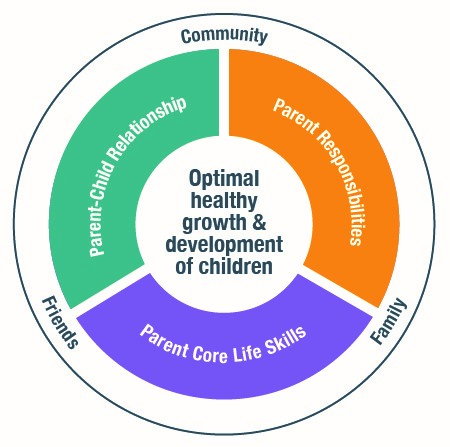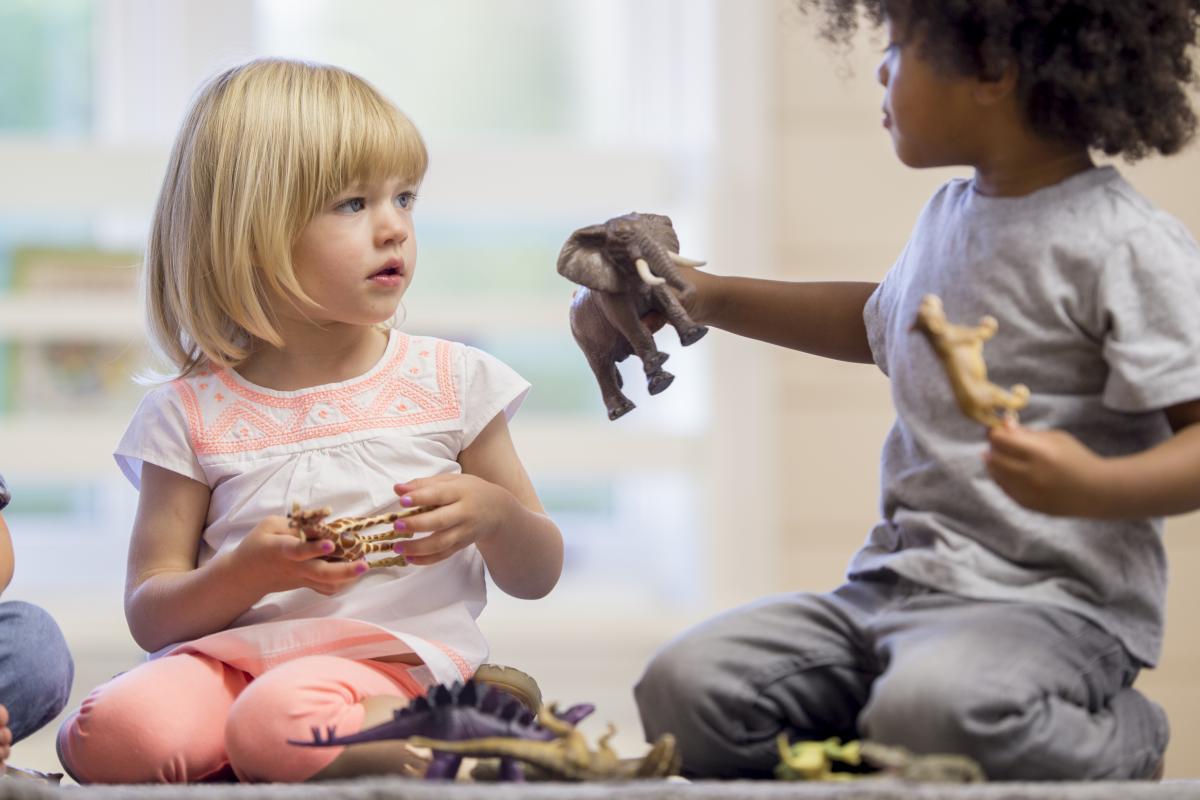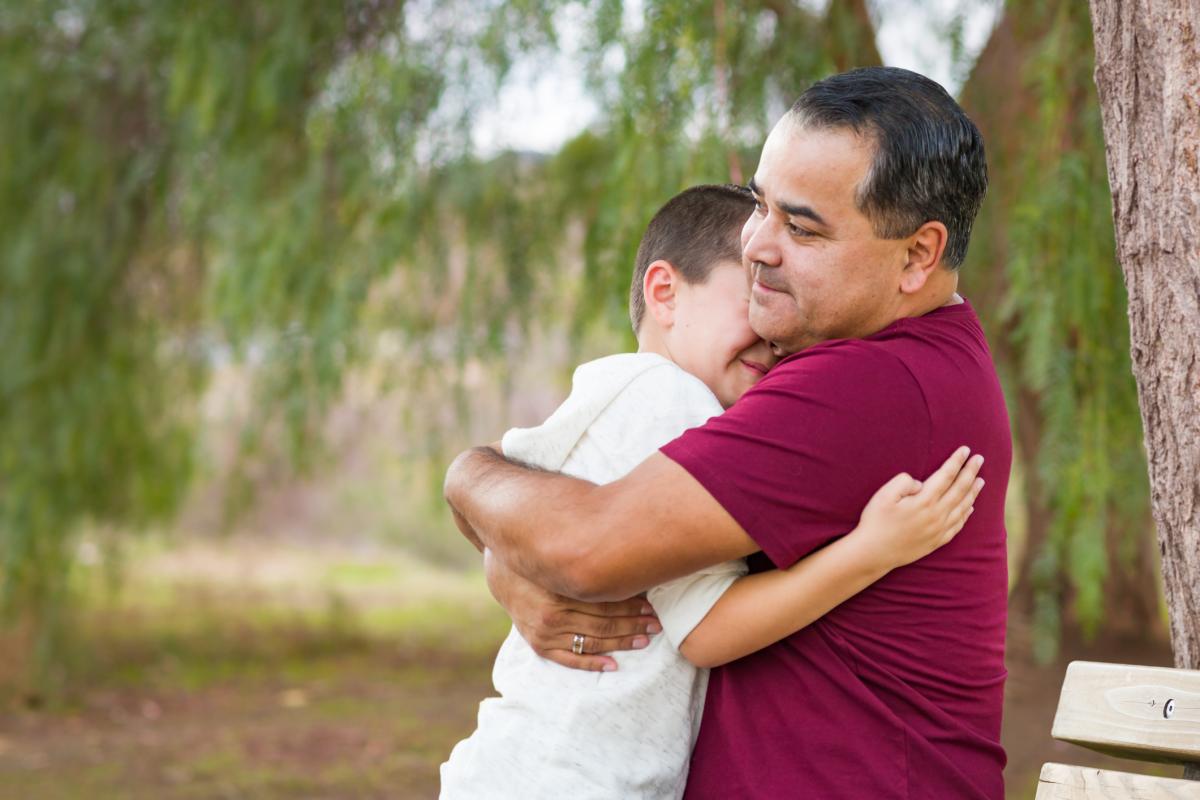You may have heard the term ‘positive parenting’. But do you know what it means? Better yet—how to do it?
Positive parenting is an approach that’s associated with healthy attachment, fewer behaviour problems and helping children cope with stress. Positive parenting and its benefits are relevant to parents of children of all ages – from infancy all the way through the teen years!
Want to learn more?
As a health promotion specialist who focuses on parenting, I’m here to walk you through the theory behind positive parenting—but as a mom with two young children, I’m adding in some practical tips to apply it. I’ve also asked some of my colleagues who have kids of different ages to share how they use positive parenting strategies with their families. Ready? Let’s get started!
OK, so what is positive parenting?
Positive parenting focuses on the relationship between parent and child. It promotes consequences that are not punishments and encourages praise and consistent boundaries.
For children to grow and develop healthily, research shows that there are many factors at play. At Public Health we focus on three:
- Parent-child relationship
- Parent responsibilities
- Parent core life skills

These factors are most effective when they exist within supportive families, friend networks and communities.
1. Build your parent-child relationship
Goal: An unconditional, nurturing and stable connection
A responsive relationship helps children feel confident that their caregiver will respond to their needs. Having this sense of security supports child development because when kids feel safe they can confidently explore their environments and learn!
At any age, you can build a responsive relationship with your child by:
- Listening to and observing them
- Correctly understanding their needs and feelings
- Responding in a way that is sensitive and appropriate
Watch this video to see how building a responsive relationship can help your child.
Responsive Care from ZEROTOTHREE on Vimeo.
But remember, responsive relationships aren’t only important for young children! These relationships can also be fostered with your school-aged child or teenager as well. For instance, see how my colleague, Rachel, maintains an unconditional, stable and nurturing connection with her teens:
“I really encourage my teens to talk to me about anything and everything. My approach is to listen more and talk less. I ask if they want any help working through a problem or if they are looking for someone to listen. I am amazed at how often they already have things worked out for themselves and are just looking for someone who will reassure, love and support them.” – Rachel McDougall, public health nurse and mom of three teens.
2. Take on parent responsibilities
Goal: Build a safe and supportive environment

A safe and supportive environment means meeting your child’s basic needs for food, water, sleep, shelter and safety.1 But is also extends to the routines and activities you do together.
It means that you:
- Enhance your child’s abilities. For example, reading regularly to a child to help build literacy skills or involving a child in meal preparation to foster independence.
- Have realistic expectations of what your child can do based on their age, temperament and developmental stage. For example, a parent with age-appropriate expectations wouldn’t scold a two-year-old for grabbing a toy away from another child. Brain science tells us that the ability to resist impulses and think through consequences only begins to emerge around age 3 or 4.2 In knowing this, a parent could instead model sharing behavior and praise their child when they play cooperatively with others. Learn more about some of the skills and behaviors you can expect from your child at different stages of development.
- Ensure consistent routines. For example, consistent meal and bedtime routines can make children feel secure, help to teach self-control and help them transition more smoothly from one activity to the next. Read more about the power of routines and get some ideas you can use with your family.
- Ensure consistent expectations. For example, setting clear and consistent expectations with my five-year-old has really helped make for smoother days for both of us. I do my best to make sure that she knows what to expect from me and what is expected of her. For example, when she is watching TV and it’s time to move on to something else, I do a countdown – “five more minutes”, “two more minutes”, etc. I find that this approach has really helped reduce the upset that can happen by having things abruptly taken away. One of the best things about this strategy is that it can be applied to so many different situations (e.g., when it’s time to leave the park, put toys away).
These types of strategies fit under the umbrella of positive discipline. Discipline can be thought of as a way to guide and teach children. Discipline that is positive plays a big part in creating a safe and supportive environment!
The way parents discipline should depend on their child’s age, stage of development, personality and many other factors. Positive discipline involves discipline that is respectful, consistent and fair. It makes your child feel good about themselves, have respect for others and learn how to problem solve.3 Get information and tips on positive discipline from Canada’s paediatricians, or watch this video series on positive ways to teach and guide your child.
3. Develop parent core life skills
Goal: Support your child’s development
Parents need core life skills to parent successfully, manage everyday life and achieve goals.

Core life skills include things like4,5:
- Planning
- Decision-making
- Focus
- Self-control
- Flexibility
- Self-awareness
- Social awareness
For families experiencing adversity (like poverty, stress or mental illness), accessing these core life skills can be difficult. Supporting parents in navigating the stress that life can bring is a key step towards positive parenting.
These skills help build self-regulation, which is the ability to manage emotions and behaviours and resist inappropriate responses when faced with stress…and let’s face it, parenting can sometimes involve stressful moments! Like, temper tantrums…
“With two toddlers at home, temper tantrums on any given day are a reality. They can be difficult to experience and at times I have felt frustrated and overwhelmed. When my three-year-old has a tantrum my approach is to take a moment to compose myself before responding. Sometimes that means taking a deep breath or counting to three in my head. When I do respond, I try my best to do so calmly and to address their behavior with compassion and empathy. Being able to regulate my own emotions so that I can respond appropriately to theirs has been key”. - Ishan Angra, Health Promotion Specialist and father to a 1- and 3-year-old.
When you have well-developed self-regulation, it’s a lot easier to model positive behaviors for your kids. These skills can help you keep your cool when frustrated instead of yelling. A parent who has access to these skills would be able to stop, assess the situation, formulate a plan and execute it.
For my two-year-old son, I find that offering a hug or a distraction often works well! Learn about strategies to promote your self-regulation, such as taking a deep breath or stopping to think when something happens that triggers your intense emotions.
Positive parenting is for all!
Although your relationship with your child(ren) will change over time, the core concepts of positive parenting are always relevant.
What does positive parenting look like for you?
Positive parenting takes practice! For more information and support, please connect with us:
- Let’s Talk Parenting E-Newsletter
- Call our Let’s Talk Parenting phone line at 1-800-265-7293 ext. 3616
References
- Maslow AH. The farther reaches of human nature. Arkana/Penguin Books; 1971.
- Zero to Three. Tuning in: National Parent Survey Overview. Washington, DC; 2017 [cited 2018 Dec 16]. Available from: https://www.zerotothree.org/resources/1424-national-parent-survey-overvi…
- Canadian Paediatric Society. When your child misbehaves: tips for positive discipline. 2017 [cited 2019 Aug 30] Available from: https://www.caringforkids.cps.ca/handouts/tips_for_positive_discipline
- Center on the Developing Child at Harvard University. Building Core Capabilities for Life: The Science Behind the Skills Adults Need to Succeed in Parenting and in the Workplace. Boston, MA; 2016 [Cited 2018 Dec 17]. Available from: http://www.developingchild.harvard.edu
